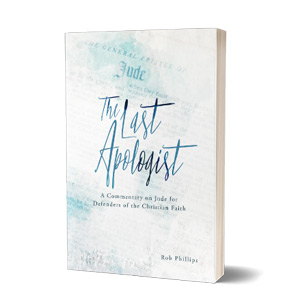The Rebellion of Korah
 The Missouri Baptist Convention has published a new resource called The Last Apologist: A Commentary on Jude for Defenders of the Christian Faith. The 275-page book is available in print and Kindle editions on Amazon, and in print from the MBC. But we also want to make each of the 16 chapters available online. This post features a portion of Chapter 10: Woe to Them! Cain, Balaam, and Korah.
The Missouri Baptist Convention has published a new resource called The Last Apologist: A Commentary on Jude for Defenders of the Christian Faith. The 275-page book is available in print and Kindle editions on Amazon, and in print from the MBC. But we also want to make each of the 16 chapters available online. This post features a portion of Chapter 10: Woe to Them! Cain, Balaam, and Korah.
Previously: The Error of Balaam
Woe to them! For they have traveled in the way of Cain, have abandoned themselves to the error of Balaam for profit, and have perished in Korah’s rebellion. (Jude 11 HCSB)
What is Korah’s rebellion?
Korah is a Levite from the Kohathite clan, which enjoys a favored position among the three clans of Levi in the assignment of priestly responsibilities (Num. 3:27-32; 4:1-20). But Korah wants more. So, he incites 250 prominent Israelites to rebel against Moses and Aaron. Together, they challenge God’s appointed leaders, accusing Moses and Aaron of exalting themselves above the Lord’s assembly.
Moses tells Korah and his followers to appear before the Lord the next morning, along with Aaron. Each is to take his firepan, place incense in it, and present his firepan before the Lord, who will choose the true leaders of Israel. When the sun rises, Korah assembles the whole community at the entrance of the tabernacle. The Lord instructs Moses and Aaron to tell the people to get away from the dwellings of Korah, along with the tents of two other rebels, Dathan and Abiram.
Immediately after Moses’ warning, the Lord intervenes in dramatic fashion: “Just as he finished speaking all these words, the ground beneath them split open. The earth opened its mouth and swallowed them and their households, all Korah’s people, and all their possessions. They went down alive into Sheol with all that belonged to them. The earth closed over them, and they vanished from the assembly…. Fire also came out from the Lord and consumed the 250 men who were presenting the incense” (Num. 16:31-33, 35).
If that isn’t enough, the next day the entire Israelite community complains that Moses has killed the Lord’s people. Immediately, the Shekinah glory appears, covering the tabernacle. God sends a plague that takes the lives of 14,700 – a number that would have been greater had Moses and Aaron not intervened on the people’s behalf.
Korah’s rebellion is not so much against God’s anointed leaders as it is against God Himself. By rejecting Moses and Aaron, and by embracing arrogant substitutes who foolishly portray themselves as eminently qualified, the people become eyewitnesses of God’s judgment and then suffer the consequences of their hard-hearted rebellion.
A poke in the eye
In a similar manner, the false teachers in Jude’s day rebel against God’s authority in the local church and thus poke their fingers in the eye of their offended God. As a result, they will be destroyed as suddenly as Korah and his apostate followers. Jude is so certain of the false teachers’ destruction that he states it in the past tense.
Korah’s words against Moses and Aaron should serve to remind us that we are held accountable for how we speak about those in authority over us. Paul writes to Titus with these instructions: “Remind them [God’s people] to be submissive to rulers and authorities, to obey, to be ready for every good work, to slander no one, to avoid fighting, and to be kind, always showing gentleness to all people. For we too were once foolish, disobedient, deceived, captives of various passions and pleasures, living in malice and envy, hateful, detesting one another” (Titus 3:1-3).
Paul then assures Titus of God’s redeeming mercy and grace, which naturally prompt His people to good works. He follows up with a final warning: “But avoid foolish debates, genealogies, quarrels, and disputes about the law, for they are unprofitable and worthless. Reject a divisive person after a first and second warning, knowing that such a person is perverted and sins, being self-condemned” (Titus 3:9-11).
In summarizing the triad of rascals from Israel’s past — Cain, Balaam, and Korah — Jude reminds his readers that opposing God’s chosen leaders is a dangerous game. The false teachers of the first century have carved out a place of service in the church, but they are not satisfied to submit to the God-ordained authority over them. In their arrogance, they speak against the apostles and other church leaders and, like the “super apostles” of 2 Corinthians 11-12, maneuver for positions of higher influence.
While castigating true servants of the Lord, these renegades are oblivious to the ground splitting open beneath their feet and the great white throne awaiting their arrival.
Warren Wiersbe summarizes Jude 11 with great insight: “Cain rebelled against God’s authority in salvation, for he refused to bring a blood sacrifice as God had commanded. Balaam rebelled against God’s authority in separation, for he prostituted his gifts for money and led Israel to mix with the other nations. Korah rebelled against God’s authority in service, denying that Moses was God’s appointed servant and attempting to usurp his authority.”
Next: Is the rebel spirit alive today?
